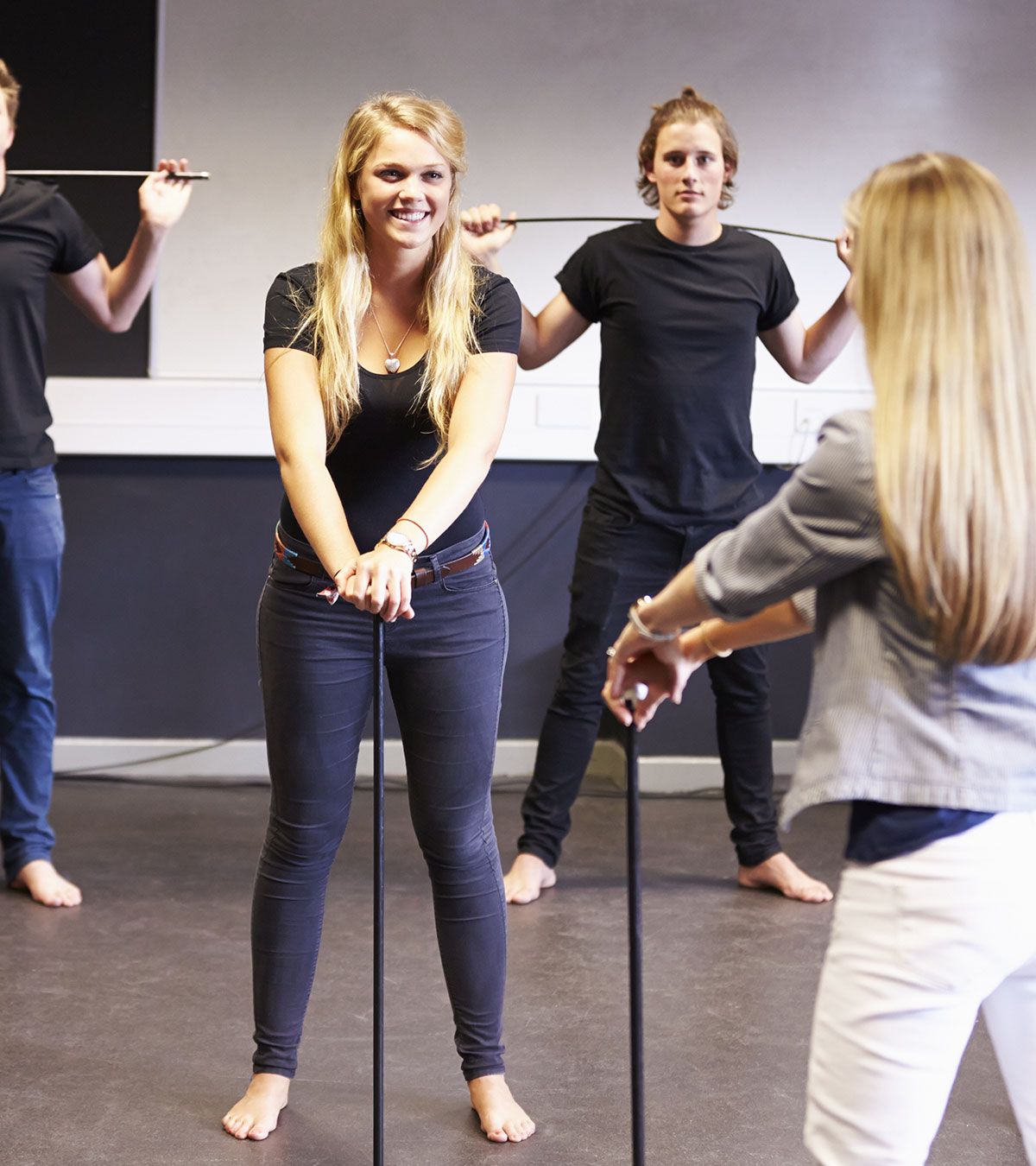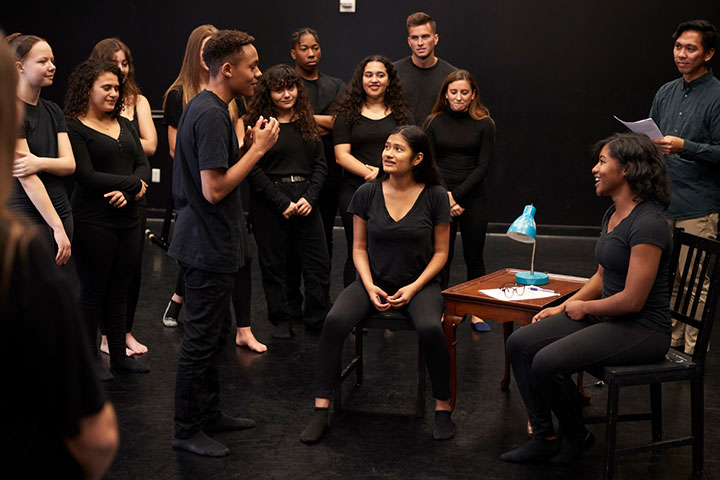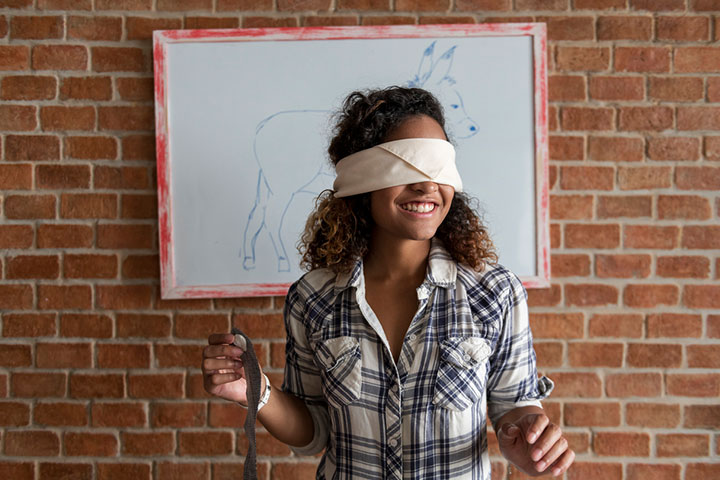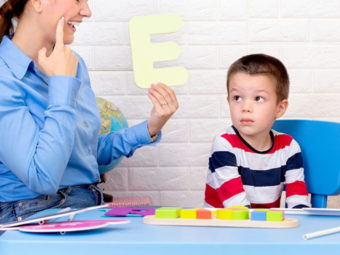
Image: Shutterstock
If your teen is shy or has difficulty making friends, improv games for teens can help them come out of their shells. These games can be a great way to help them open up and express themselves better. They will help them mingle with other children more easily. Moreover, active and energetic teens can channel their energy into these drama games while exploring their creativity. So, here’s our list of some fun and interesting improv games. Read on to know more.
Drama Games For Teens
1. Count the one, two, threes
Let your teen pair up with a partner for this fun game. It is an absorbing way to improv concentration and hone one’s multi-tasking abilities.
- First, ask your teen to stand facing the partner and keep counting one, two, three over and over again.
- Once the pair can do so comfortably, ask them to clap their hands instead of saying ‘one.’ They will still have to say two and three out loud. So the pattern will be a clap, followed by saying two, three out loud.
- Once the pair can do this step, they have to exchange the word ‘three’ for the act of bending their knees. So, the pattern will be a clap, say the word ‘two’ out loud and then bend the knees. It has to continue like this over and over again.
- Once your teens can master these movements and do them properly, ask them to create their steps and incorporate the same.
2. The truth and lie hide and seek
Image: IStock
The aim of this drama game is to try and improv the facial expressions. Your teens will have to master the art of convincing and maintaining their expressions, whether they are lying or are being truthful.
- If there are many teens around, they can all sit down in a circle to play the game. In case there are not too many teens, you can divide them up into pairs and ask them to sit facing each other.
- For the game, each teen has to start by introducing himself with three lines about self. The teens will have to say two true things about themselves, but one lie to the audience. While doing so, your teen will have to try and keep the expressions as calm and natural as possible, so that the other teens are not able to spot the lie.
- The other teens who are listening to the introduction will have to try and read the facial expressions and detect the lie. Once a teen gets caught, he steps out of the game, while the teen who found the lie wins a point.
- The teens can also play this as a group challenge, where one team will be the spotters and the other team has to lie. The teens in the lying group can choose who will tell the lie. Once ready, the teens in the lying group can introduce themselves with one sentence each. While all the teens in the group will tell the truth, only one teen will lie. The other group has to try and spot out who is lying. You can keep reversing the groups into the lying and the spotting teams for each round.
 Point to consider
Point to consider3. Catching the name
Here is a fun way to introduce your teen to new friends, or just throw a challenge game amongst friends. It will help build concentration.
- Let your teen and friends sit in a circle. For the game, your teen can use a ball or a throw pillow.
- The teen with the ball or the pillow has to throw it at random at any other teen in the circle. While doing so, the teen who is throwing the ball will have to say his name out loud. For instance, if your teen is throwing the ball while doing so he will have to say “Hi I’m so and so.” Make sure that your teen is looking at the other teen while saying his name. Once the other teen receives the ball, he has to throw it to another teen while saying his name.
- First, let all the teens get comfortable with each other and be able to practice this over and over again.
- Once they can do so, take the game to the next level. Now when your teen throws the ball, instead of just introducing himself, he will have to say his name and the name of the person he is throwing the ball to. For instance, he has to say something such as “so and so is throwing at so and so.” Keep repeating the game till all the teens are comfortable and can say it.
- For the next stage, the teen who throws the ball has to fold his arms in front of him to signal that he has already played. As the tempo of the game builds up, the teen who throws the ball has to be careful and not throw the ball at any teen whose hands are folded. While concentrating on the folded hands, the teens will also have to remember to say the right sentences.
4. Counting up and down
Here is another fun drama game for teenagers that will help them to improve his concentration as well as hone his patience skills.
- Let the teens sit down together and form a circle. The idea is that the teens will have to do a count up and a countdown, without any particular order of person. For instance, one teen starts the game by saying out the word ‘one’ and any other teen in the circle can say the next number.
- The teens have to be extremely alert and ready so that they can say out the numbers in sequence.
- It is not allowed to repeat a number during the same round, for instance, if a teen says the number ‘four’ the other teen cannot say the same again, as it will lead to a negative marking. The teens have to concentrate on the numbers that are being said and also use their patience to take their turn properly.
5. What are you doing
Image: IStock
In this fun acting game, your teen will have to keep his focus on high alert and put his fast thinking skills to use.
- One teen has to take center stage and perform an act of doing something, without saying anything out loud. You can let all the other teens stand in a queue or sit in a circle.
- Now one teen gets up and asks the teen what he is doing. He has to answer anything else other than what he is doing. For instance, if he is performing the action of dancing, he will have to say something else, such as “I am brushing my teeth.”
- The teen who asked the performer “What are you doing” will have to start immediately acting on the action that the other teen said, in this case, “I am brushing my teeth.”
- Now another teen will come up and ask “What are you doing” and the game continues till everyone gets a chance to perform.
6. Shake up the sequence
This fun game will help your teen warm up and get ready for a performance or just for fun.
- All the teens have to stand up and together count out from one to ten. While saying out each number, they have to shake their right arm. Next, they have to count down from ten to one and shake their left arm.
- Once they have finished the sequence, they have to start counting again from one till nine and shake the right leg. Next, they have to count down nine to one and shake their left leg.
- Keep changing the sequence like this till the teens are left with counting only from zero to one and back.
7. Shake up a storm
The game will help teens modulate their voices.
- Let all teens stand up on one side of the room and one teen takes on the role of the conductor. The conductor has to move his arms up or down, showing how to build up the crescendo.
- The teens will have to concentrate on the driver’s movement and modulate their voice accordingly. In this way, the storm will build up and subside and build up and down again. Add actions such as stomping feet for thunder, rubbing hands together for breeze and so on..
8. The voice over
Image: IStock
Here is another game that will help your teen practice expressions through voice.
- Blindfold one teen at a time and let all the teens stand in a queue. Now one teen goes over to the blindfolded teen, disguises his voice and his tone and says something such as “who am I?”
- The blindfolded teen has to guess the teen’s name correctly. If the answer is right, the blindfold passes on and so on. Make sure all the teens have a turn at being blindfolded and at disguising their voice.
9. Walk with me
This game will teach your teen to follow cues without being told and how to read body language.
- Let all the teens stand around the room and start walking on a given signal. Make sure they walk all over the room and use up all available space. At another given signal, all the teens have to stop and freeze wherever they are.
- Let them practice till they get the hang of it. Next, the teens will have to do the same thing but without being given a signal. They will have to read each other’s body language and start walking as a group, and stop at the same time as well.
Super Fun Improv Games For Teens
10. The no sense dictionary
Here is a fun improv game that will help your teens concentrate on what others are saying, and come up with a made up answer to that in an instant.
- Let the teens sit down in a circle. One teen starts by saying a word. The teen sitting next has to come up with any word randomly, which does not have to be connected to the first word.
- For instance, the first teen says the word ‘spaghetti’ and the second teen says the word ‘book.’ The third teen has to immediately come up with a definition sort of statement which will have to include the two words mentioned earlier. The teen can come up with anything, as long as it is fun and creative. A fun sentence could be something such as “The spaghetti has recently been declared as one of the most delicious form of bookmark that any book lover could use, especially while reading during a meal.”
- To make it fun, you can also change the order and pick any two people at random to say the words and a third random person to come up with the definition.
11. Act-ionary
Image: IStock
Here is a game that is not just an extension of dumb charades, but is a great way to help your teen express and emote.
- Divide up the teens into different groups depending on the number of teens that are there. One teen will have to help lead the game, so count out one teen from the groups.
- Hand out a sheet of paper and pen to each group and ask them to come up with a list of words, expressions and such that have to be acted out. Try to keep them as expression oriented as possible.
- Make sure that the teens write their team names on the paper, such as team A, team B or anything that can distinguish them apart.
- The teen who will help to lead the game will take the lists and make sure that he hands the opponent team’s list to the player who comes up to act. The player will see the word and then go back to his team and emote, without saying anything. The players have to guess the right emotion, expression or word that is mentioned in the list.
Benjamin Lloyd, a blogger and the owner of a performing arts studio in Pennsylvania, shares an interesting structured improvisation technique he uses for his theater group, including differently-abled students. He explains, “We create these scenarios using ‘structured improvisation’ in which we design a simple three-act story based on our client’s needs, and our actors rehearse and perform it like it’s a little play. Except it isn’t because there’s no script.
“With this technique, everyone in the class can participate to their full potential… Our students are gaining confidence, developing verbal skills, acquiring emotional intelligence, and learning basic narrative structure: beginning, middle, end (i).”
12. Freeze and justify
It is a great improv game for teenagers that will help them to think on his toes and come up with something immediately.
- Let all the teens sit in a circle and ask any two teens to stand in the middle. Say any scene out loud that the teens will have to enact there. The key is to use a lot of hand movement, expressions and such.
- During any time that the teens are performing, any other teen can shout out the word ‘Freeze.’ The performing teens will have to freeze in their act immediately.
- The teen who shouted ‘Freeze’ has to get up and tap any one of the performing teens, who will now sit back. The new teen will have to take over the act and start a new one, by initiating the movements and communicating to the partner how the new act will proceed.
- As all this has to be done without speaking, it is a unique way to help the teens express themselves and communicate through their facial and body language. Make sure all teens get a chance at performing.
13. Only a word
In this fun improv game, your teen will build his concentration skills and use his fast thinking skills to good use.
- Use a ball to initiate the game. The idea is to build up a story where each teen says only one word at a time. For instance, your teen rolls the ball out by saying out a word, such as “there” or “once.”
- The teen who gets the ball says another word to maintain the flow and rolls out the ball. Whoever gets the ball says the next word and so on.
14. Changing action
Image: IStock
In this improv game, your teen will have to be ready to exercise his mental as well as physical prowess. It’s a great way to improv concentration and retain memory.
- Let the teens sit in a circle and one person sits inside to start the game. The starter of the game does some action, such as clapping hands while the others watch. Now the starter says ‘change’ and starts doing another action, such as rubbing hands together.
- The teens have to remember the previous action and start clapping their hands. Now, when the starter shouts ‘change’ and does a different action, the teens have to start rubbing their hands together.
- The game will continue this way where all the teens have to mimic the action that the starter was doing before shouting ‘change.’
15. Hey
The game will teach your teen how to focus and perform in sync.
- Let all teens stand in a circle while one teen stands in the middle. The teen calls out ‘hey’ and all teens have to look directly in some other teen’s face. There will be some teens who will be looking away from each other, but some who will realize that they are staring directly at someone else.
- When that happens, the two teens who are looking into each other’s eyes have to say ‘hey’ and move out.
16. Story cubes
This game boosts your teen’s imagination and brings out their creativity. It is also a great way to have a fun time listening to impromptu stories. You will need the story cube dice with images on all six sides.
- Let the teens sit in a circle. One participant can start with a line to start a story.
- The next person then rolls the dice and continues the story by incorporating the image seen on the dice.
- Each person has to ensure that they add to the story to take it forward in the most creative way they can.
- They can even narrate the story with loud expressions, dialogues, and funny sounds to make the game more interesting.
Improvisation and theater games are a great way to encourage spontaneity, build confidence, and bring out the natural creativity in teenagers. These games are a fun and engaging way to break the ice and create a positive and inclusive atmosphere in drama class. They also promote teamwork and communication skills, which are important not only in theater but also in everyday life.
Frequently Asked Questions
1. What are the basic rules of improv?
While each improv game has different rules, a basic rule that applies to all is to let loose and have fun. Remember that it is just a game, so there is no need to overthink or be afraid of failure.
2. How do you make improv more interesting?
You can make an improv game more interesting by changing the rules or adding more. For example, in dumb charades, you could set a time limit or allow one letter to be spoken as a hint.
3. What are some tips for facilitating improv games for teens?
When facilitating improv games for teens, it is crucial to establish a safe and supportive environment that encourages risk-taking and creative expression. Foster teamwork and trust by promoting active listening and collaboration among participants.
4. How can I adapt improv games for teens with different skill levels or abilities?
To adapt improv games for teens with different skill levels or abilities, consider modifying the complexity of the game or providing different roles within the activity. Simplify game rules or introduce variations that accommodate different skill levels, ensuring everyone can participate and contribute. Additionally, provide support or additional guidance for teens who may require it, allowing them to fully engage and enjoy the experience alongside their peers.
5. Are there any safety considerations to keep in mind when playing improv games with teens?
Yes, there are safety considerations to remember when playing improv games with teens. Ensure the physical space is clear of hazards to prevent accidents during movement-based activities. Establish clear boundaries and guidelines for respectful and appropriate behavior to maintain a safe and inclusive environment. Additionally, be aware of potential emotional triggers or sensitivities among participants and create a supportive atmosphere where everyone feels comfortable and respected.
6. How can parents or teachers incorporate improv games into their lessons or activities with teens?
Parents or teachers can incorporate improv games into their lessons or activities with teens by integrating them as ice breakers or energizers at the beginning of a class or session. They can also use improv games to teach communication, problem-solving, or team-building skills by selecting games that focus on these areas. Additionally, improv can be used to explore literature or historical events through improvised scenes or character perspectives. Lastly, incorporating improv games into group projects or presentations can enhance creativity and engagement among teens.
7. What are some challenges that teens might face when playing improv games?
Teens may experience self-consciousness or fear of judgment, hindering their spontaneity and creativity. Some may struggle with thinking on their feet or generating ideas quickly, leading to performance anxiety. Additionally, teens may find it challenging to let go of control and fully embrace the collaborative nature of improv, as it requires trust and a willingness to take risks.
Drama games not only teach theater skills but also help hone other essential skills, such as creativity, imagination, and confidence. Improv games help prepare individuals to think on their feet in case of eventualities. These interesting drama and improv games for teens will also enhance your teen’s ability to decipher body language and focus and express their feelings better. So, pick an interesting game for your teen to help them learn new skills while having fun.
Key Pointers
- Improv games can help shy and introverted children open up and express themselves more comfortably.
- These games also benefit extroverted teens as they can channel their energy into creative activities.
- Games such as Counting Up And Down and Shake Up The Sequence help improve children’s concentration and focus.
- Games such as Only A Word and Story Cubes help boost their imagination and hone their storytelling skills.
- Walk With Me and Freeze And Justify are games that help teens build social skills.
Come join us for a fun game of Comedy Improv! We’ll be playing the Alphabet Game, where you’ll have to come up with creative words and phrases starting with each letter of the alphabet. Get ready for some laughs!
Personal Experience: Source
MomJunction articles include first-hand experiences to provide you with better insights through real-life narratives. Here are the sources of personal accounts referenced in this article.
i. What improv offers the differently abled;https://medium.com/@bxlloyd/what-improv-offers-the-differently-abled-c426b1948b45





















